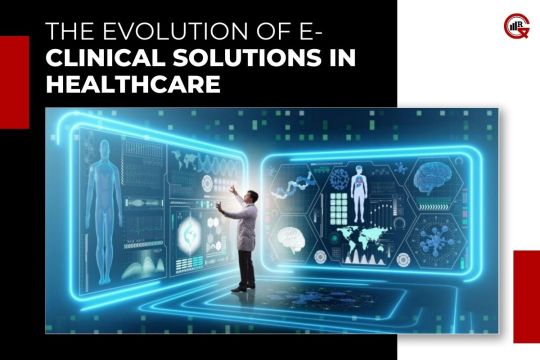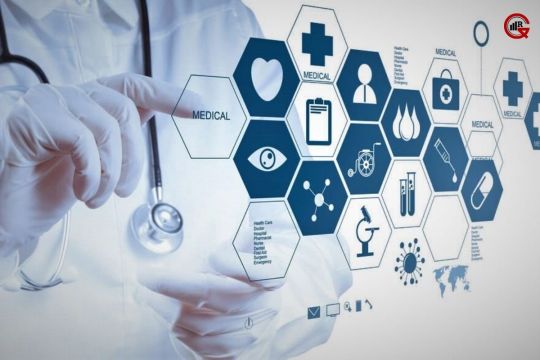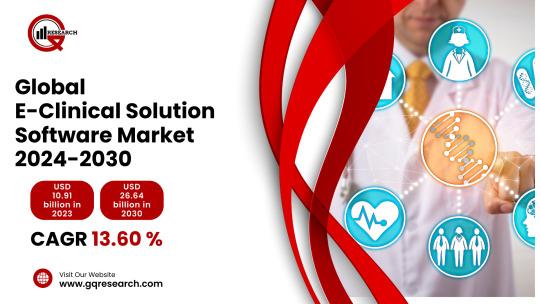#EclinicalSolutions
Text
Revolutionizing Healthcare: The Impact Of E-Clinical Solution Software

In the dynamic landscape of healthcare, where technological innovations are reshaping traditional practices, solution software emerges as a revolutionary force. These digital platforms are transforming the management of clinical trials, patient data, and healthcare delivery worldwide. In this comprehensive exploration, we delve into the core features, benefits, and transformative impact of e-clinical solution software on modern healthcare systems.
Understanding E-Clinical Solution Software
E-clinical software comprises a suite of digital tools meticulously designed to streamline various facets of clinical trials and healthcare management. These encompass Electronic Data Capture (EDC), Clinical Data Management (CDM), Clinical Trial Management Systems (CTMS), and Electronic Patient-Reported Outcomes (ePRO), among others, crucial for efficient trial conduct.
The primary objective of e-clinical solutions is to bolster the efficiency, accuracy, and compliance of clinical trials while concurrently reducing operational costs and timelines. These platforms foster seamless collaboration among stakeholders, including sponsors, investigators, site staff, and regulatory bodies, thereby optimizing the entire clinical trial lifecycle from inception to completion.
Features and Capabilities

Clinical Data Management (CDM): CDM modules streamline the organization, integration, and quality control of clinical trial data. These systems ensure data consistency, compliance with regulatory standards, and adherence to predefined protocols, thereby augmenting data integrity and reliability.
Clinical Trial Management Systems (CTMS): CTMS platforms streamline the planning, execution, and monitoring of clinical trials. They provide comprehensive oversight of study timelines, milestones, budgets, and resources, enabling efficient trial management and optimization of operational workflows.

Regulatory Compliance and Reporting: E-clinical solution software ensures compliance with regulatory requirements, such as Good Clinical Practice (GCP) guidelines, Health Insurance Portability and Accountability Act (HIPAA) regulations, and International Council for Harmonization (ICH) standards. These platforms facilitate the generation of regulatory submissions, audit trails, and safety reports, thereby simplifying regulatory compliance and reporting processes.
Benefits of Solution Software
Enhanced Efficiency: By automating manual processes, streamlining workflows, and facilitating real-time data access, e-clinical solutions significantly enhance the efficiency of clinical trials and healthcare management. These platforms accelerate study timelines, reduce administrative burden, and optimize resource utilization, ultimately improving overall productivity and cost-effectiveness.
Improved Data Quality: E-clinical solution software promotes data accuracy, completeness, and consistency throughout the clinical trial lifecycle. By implementing built-in validation checks, data cleaning algorithms, and electronic source data verification (SDV) mechanisms, these platforms minimize data errors and discrepancies, ensuring high-quality and reliable clinical trial data.
Enhanced Collaboration: E-clinical solutions foster seamless collaboration and communication among stakeholders involved in clinical trials, including sponsors, investigators, study coordinators, and regulatory agencies. These platforms provide centralized access to study information, facilitate real-time data sharing, and enable remote monitoring and oversight, thereby enhancing collaboration and coordination across geographically dispersed teams.

Comprehensive Analytics: E-clinical solution software enables advanced data analytics and reporting capabilities, allowing stakeholders to derive actionable insights from clinical trial data. These platforms support data visualization, trend analysis, risk identification, and predictive modeling, facilitating informed decision-making and continuous process improvement throughout the clinical trial lifecycle.
The Future of E-Clinical Solutions
As the healthcare landscape continues to evolve, the adoption of e-clinical solution software is poised to accelerate further, driven by technological advancements, regulatory requirements, and industry trends. Future developments in artificial intelligence (AI), machine learning (ML), blockchain, and digital health technologies are expected to further enhance the capabilities and functionalities of e-clinical solutions, paving the way for more efficient, patient-centric, and data-driven healthcare delivery models.
In conclusion, e-clinical solution software represents a paradigm shift in the way clinical trials are conducted and healthcare is delivered. By harnessing the power of digital technologies, these platforms offer myriad benefits, including enhanced efficiency, improved data quality, enhanced collaboration, patient-centricity, and comprehensive analytics. As healthcare organizations increasingly recognize the value of e-clinical solutions, the adoption and integration of these innovative platforms will continue to drive positive transformation across the entire healthcare ecosystem, ultimately leading to improved patient outcomes and population health.
0 notes
Text
"The Role of eClinical Solutions in Decentralized Trials"
eClinical solutions are transforming the landscape of clinical trials and pharmaceutical research by streamlining data management, enhancing trial efficiency, and improving patient outcomes. These integrated technological systems encompass a range of digital tools, including electronic data capture (EDC), clinical trial management systems (CTMS), and electronic patient-reported outcomes (ePRO). By leveraging cloud-based platforms, artificial intelligence (AI), and machine learning (ML), eClinical solutions facilitate real-time data analysis, reduce the time and cost associated with clinical trials, and ensure regulatory compliance. The growing adoption of eClinical solutions is driven by the need for more efficient and flexible trial designs, especially in the wake of the COVID-19 pandemic, which highlighted the importance of remote monitoring and decentralized trials. However, challenges such as data security, integration with legacy systems, and the need for standardization remain. Despite these hurdles, the future of eClinical solutions is promising, with continuous technological advancements and increasing investment expected to drive significant progress in clinical research and development.
#eClinicalSolutions #ClinicalTrials #PharmaceuticalResearch #DataManagement #AIinHealthcare #MachineLearning #ePRO #ClinicalTrialManagement #RemoteMonitoring #DecentralizedTrials #HealthTech #BiotechInnovation #DataSecurity #HealthcareIT #ClinicalResearch
0 notes
Text
eClinical Solutions Help Reduce Human Errors and Manage Clinical Data With Real-Time Analysis
eClinical solutions are used to improve the clinical development process through data analysis and management. It offers clinical and operational data by providing data management software and customized data management services, including clinical reporting, electronic data capture, data management and standardization, and clinical data repository platform, with total transparency. eClinical solutions allow users to standardize, integrate, manage, and analyze all their clinical and operational data with the help of integrated advanced visualization and analytical capabilities. Moreover, eClinical software help users to comply with budgeting, investigator management, patient management, government regulations, and adverse event reporting system among others.
eClinical solutions integrate electronic health records, eTechnologies, electronic consent forms, clinical data management systems, and electronic data capture. Moreover, they are helping researchers in lengthy clinical research processes through proper management. eClinical solutions have gathered substantial market proposition among pharmaceutical and biopharmaceutical companies for streamlining their clinical trials and insights discovery across various phases from I to IV.
Read more @ https://coherentmarketinsights-cmi.blogspot.com/2021/01/eclinical-solutions-help-reduce-human.html
#eClinicalsolutions#clinicalreporting#electronicdatacapture#datamanagement#standardization#clinicaldatarepositoryplatform
0 notes
Link
0 notes
Text
Electronic Data Capture (EDC) Market - Demand for trending development 2025
Global Electronic Data Capture (EDC) Market: Snapshot
Electronic data capture (EDC) are electronic systems including software for the collection of a variety of clinical data, primary used for human clinical trials. These systems streamlines the entire collection methodology starting from the design to the data reporting, facilitating workflows in clinical trials. EDC systems are helpful for accelerating the time to market for drugs and help in easing the regulatory hurdles in new medical device development. These systems are being increasingly adopted by pharmaceutical companies and contract research organizations in various parts of the world. They are particularly beneficial in high risk trials since they help in eliminating discrepancy in data entry, leave a reliable audit trail, and allow for centralized review across the process. The use of EDC system not only decreases the physical storage space and reduces the maintenance cost but helps in ensuring patient safety as well. A user-friendly reporting platform and intuitive interface are some of the key features of EDC systems. Using EDC software, data for a clinical trial can be imported from a variety of sources in a seamless manner
Request Sample Copy of the Report @
https://www.tmrresearch.com/sample/sample?flag=B&rep_id=2546
The need for cleaner data and more efficient clinical trial is a prominent aspect driving the demand for electronic data capture systems. The ability of web-based EDC systems to support real time access of data is one of the key factors stoking their popularity. The unique benefit of adaptive trial designs in EDC systems is an attractive proposition boosting their adoption in next-generation healthcare system. The global electronic data capture market is likely to benefit from the advent of open source EDC software. The market will also benefit from the rising popularity of integrated EDC systems. The advent of cloud-enabled electronic data capture services is a welcome development in the market by enabling end users make high-performance clinical research in multiple environments.
Global Electronic Data Capture (EDC) Market: Overview
Electronic Data Capture (EDC) leverages different systems, which slightly vary in terms of features and functionalities, to gather clinical trial data in electronic form. A software, it streamlines and stores patient data accumulated during clinical trials. Data is either procured electronically or first recorded on paper and then transcribed into the system and saved in an electronic case report form (eCRF). Some of the basic features of an electronic data capture (EDC) are eCRF designer, query management, data entry, and data export.
Request TOC of the Report @
https://www.tmrresearch.com/sample/sample?flag=T&rep_id=2546
Contract research organizations (CROs), sponsors, and sites are increasingly making a transition to electronic data software (EDC) for clinical trials on account of the advantages it accords. Institutions can either choose to build their own systems in-house or leverage the services of an EDC vendor.
Global Electronic Data Capture (EDC) Market: Key Trends
An electronic data capture (EDC) brings about quicker access to data, accuracy, and ensures data security with appropriate technical controls. Besides, it also brings about compliance with regulatory requirements – a factor that has majorly underpinned its demand as most clinical trials fall flat on their face because of being unable to satisfy regulatory needs that delay drugs in becoming commercially available.
Moreover, an electronic data capture (EDC) aids in upping efficiency of clinical trials because of its user-friendly navigation. It easy to locate and filter what is needed. To top it all off, an electronic data capture (EDC) comes in different price ranges to suit every budget. Plus, in the long run, it helps to save money notwithstanding the upfront investment. On account of the aforementioned unique perceived benefits, EDC systems are seeing significant uptake.
Other factors lending support to the market are the growing complications in managing clinical information generated before, during, and after the trial and continued technological improvements in the systems.
Global Electronic Data Capture (EDC) Market: Market Potential
The global market for electronic data capture (EDC) is highly dynamic with new developments constantly reshaping the competitive contours. Some such recent developments to have rocked the market are the raising of $30 million by clinical trial software company Medrio from Questa Capital Management for building of new software programs and the extending of partnership between CROS NT and Medidata that would enable the former’s customers’ access to Medidata’s electronic data capture (EDC) solution.
Read Comprehensive Overview of Report @
https://www.tmrresearch.com/electronic-data-capture-market
The cloud-based delivery systems for electronic data capture (EDC) services are primed for healthy growth in the near future on account of soaring demand, which in turn would be stoked by the greater efficiency in different applications, namely the trial design, data collection, and monitoring and report generation such modes of delivery bring about.
Global Telecom Managed Services Market: Regional Outlook
Geographically, the main segments of the market electronic data capture (EDC) are Europe, Asia Pacific, North America, and the Rest of the World. Of them, North America is a key region due to the high degree of awareness about the benefits of such systems and strict regulations relating to handling with clinical information. Presence of prominent pharmaceutical companies in the region is also said to be catalyzing market growth in the region.
Global Electronic Data Capture (EDC) Market: Competitive Analysis
In order to gauge the competition prevailing in the global market for electronic data capture (EDC), the report profiles companies such as Oracle Corporation; Medidata Solutions, Inc.; BioClinica; Parexel International Corporation; eClinicalSolutions; Merge Healthcare, Inc.; Openclinica, LLC., OmniComm Systems, Inc.; and Acceliant.
About TMR Research
TMR Research is a premier provider of customized market research and consulting services to business entities keen on succeeding in today’s supercharged economic climate. Armed with an experienced, dedicated, and dynamic team of analysts, we are redefining the way our clients’ conduct business by providing them with authoritative and trusted research studies in tune with the latest methodologies and market trends.
Contact:
TMR Research,
3739 Balboa St # 1097,
San Francisco, CA 94121
United States
Tel: +1-415-520-1050
Email: [email protected]
0 notes
Text
The Evolution Of E-Clinical Solutions In Healthcare

(Source – Linkdn )
In the fast-paced world of healthcare, where data is king and efficiency is paramount, E-Clinical solutions have emerged as indispensable tools for streamlining clinical trial processes, optimizing patient care, and driving innovation. From electronic data capture (EDC) and clinical trial management systems (CTMS) to electronic health records (EHR) and telemedicine platforms, clinical solutions encompass a wide range of technologies designed to enhance the efficiency, accuracy, and accessibility of healthcare data and services. In this article, we explore the evolution of clinical solutions, their applications across the healthcare continuum, and the transformative impact they have on patient outcomes and research advancements.
Evolution of E-Clinical Solutions
The evolution of E-clinical solutions can be traced back to the early days of digital transformation in healthcare, marked by the transition from paper-based records to electronic systems. As technology advanced and regulatory requirements evolved, clinical solutions expanded to encompass a comprehensive suite of tools and platforms designed to support clinical research, healthcare delivery, and patient engagement:
Electronic Data Capture (EDC): EDC systems revolutionized clinical trial data collection by replacing paper-based case report forms (CRFs) with electronic forms that could be completed, submitted, and monitored in real time. EDC systems not only improve data accuracy and completeness but also accelerate the data collection process, enabling faster analysis and decision-making.

Electronic Health Records (EHR): EHR systems digitize patient health information, including medical history, diagnoses, medications, and laboratory results, enabling healthcare providers to access and share patient data securely. EHR systems improve care coordination, facilitate evidence-based decision-making, and enhance patient safety by providing a comprehensive view of the patient’s health status across care settings.
Telemedicine Platforms: Telemedicine platforms leverage technology to facilitate remote consultations, diagnosis, and treatment, enabling patients to access healthcare services from the comfort of their homes. Telemedicine platforms improve access to care, particularly in rural or underserved areas, and reduce barriers to healthcare delivery such as travel time and cost.
Applications of E-Clinical Solutions

Patient-Centric Care: Clinical solutions empower patients to actively participate in their healthcare journey by providing access to their health information, facilitating communication with healthcare providers, and enabling self-management of chronic conditions. Patient portals, mobile health apps, and remote monitoring devices empower patients to take control of their health and engage in shared decision-making with their care teams.
Population Health Management: E-clinical solutions support population health management initiatives by aggregating and analyzing data from disparate sources to identify trends, patterns, and risk factors within patient populations. By leveraging predictive analytics, care coordination tools, and population health dashboards, healthcare organizations can proactively intervene to improve outcomes, reduce costs, and enhance the health of their communities.
Benefits of Clinical Solutions
Improved Efficiency and Productivity: Clinical solutions automate manual processes, reduce paperwork, and streamline workflows, enabling healthcare providers and researchers to focus their time and resources on delivering high-quality care and conducting meaningful research.
Enhanced Data Quality and Accuracy: By digitizing data collection and storage, E-clinical solutions minimize the risk of errors, transcription mistakes, and missing information commonly associated with paper-based records. Real-time data validation checks and electronic signatures further ensure data integrity and compliance with regulatory requirements.
Enhanced Collaboration and Communication: Clinical solutions facilitate seamless communication and collaboration among healthcare providers, researchers, patients, and other stakeholders. Shared access to patient data, secure messaging platforms, and virtual collaboration tools enable interdisciplinary care teams to coordinate care effectively and exchange information in real time.
Greater Access to Care: Telemedicine platforms and patient portals expand access to healthcare services, particularly for individuals in remote or underserved areas with limited access to traditional healthcare facilities. By leveraging technology to overcome geographical barriers, clinical solutions improve patient access to timely, affordable, and high-quality care.
Challenges and Considerations
Data Security and Privacy: E-clinical solutions raise concerns about the security and privacy of patient health information, particularly in light of increasingly sophisticated cyber threats and regulatory requirements such as the Health Insurance Portability and Accountability Act (HIPAA). Robust security measures, encryption protocols, and compliance frameworks are essential to safeguard patient data and maintain trust in clinical solutions.
Interoperability and Data Integration: The interoperability of eClinical systems remains a significant challenge, with disparate platforms often unable to communicate and share data seamlessly. Standardization efforts, interoperability frameworks, and health information exchange (HIE) initiatives aim to address these challenges by facilitating data exchange and interoperability among different systems and stakeholders.
Digital Divide and Access Disparities: While E-clinical solutions hold promise for improving healthcare access and outcomes, disparities in digital literacy, internet connectivity, and access to technology persist, particularly among underserved populations. Bridging the digital divide and ensuring equitable access to clinical solutions require targeted interventions, community partnerships, and policy initiatives aimed at addressing socioeconomic barriers to technology adoption.
Future Directions and Innovations

Blockchain Technology: Blockchain technology offers a decentralized, secure, and immutable platform for storing and sharing healthcare data, enhancing data security, privacy, and interoperability. By leveraging blockchain-based solutions, clinical systems can ensure the integrity, traceability, and transparency of health information while empowering patients to control access to their data and participate in data-sharing networks.
Conclusion
In conclusion, E-clinical solutions represent a transformative force in healthcare, empowering stakeholders to deliver high-quality care, conduct cutting-edge research, and improve patient outcomes. From clinical trial management and patient engagement to population health management and telemedicine, E-clinical solutions offer a myriad of benefits that drive efficiency, innovation, and collaboration across the healthcare continuum. Despite challenges such as data security, interoperability, and access disparities, ongoing advancements in technology, policy, and practice continue to propel the evolution of clinical solutions, shaping the future of healthcare delivery and research in an increasingly digital world.
0 notes
Text
E-Clinical Solution Software Market Dynamics: Trends, Innovations, and Future Prospects| GQ Research
The E-Clinical Solution Software market is set to witness remarkable growth, as indicated by recent market analysis conducted by GQ Research. In 2023, the global E-Clinical Solution Software market showcased a significant presence, boasting a valuation of US$ 10.91 billion. This underscores the substantial demand for E-Clinical Solution Software technology and its widespread adoption across various industries.
Get Sample of this Report at: https://gqresearch.com/request-sample/global-e-clinical-solution-software-market/

Projected Growth: Projections suggest that the E-Clinical Solution Software market will continue its upward trajectory, with a projected value of US$ 26.64 billion by 2030. This growth is expected to be driven by technological advancements, increasing consumer demand, and expanding application areas.
Compound Annual Growth Rate (CAGR): The forecast period anticipates a Compound Annual Growth Rate (CAGR) of 13.60%, reflecting a steady and robust growth rate for the E-Clinical Solution Software market over the coming years.
Technology Adoption:
In the E-Clinical Solution Software market, technology adoption is shaped by the diverse range of applications these solutions offer. E-Clinical solutions encompass a variety of software applications designed to streamline and enhance various aspects of clinical trials and healthcare research. These applications include electronic data capture (EDC) systems, clinical trial management systems (CTMS), electronic patient-reported outcomes (ePRO) tools, and electronic clinical outcome assessment (eCOA) platforms, among others. The adoption of technology in this market is driven by its ability to improve efficiency, accuracy, and compliance throughout the clinical trial process, ultimately accelerating the development of new medical treatments and therapies.
Consumer Preferences:
Consumer preferences in the E-Clinical Solution Software market are influenced by several key factors. Healthcare organizations, pharmaceutical companies, contract research organizations (CROs), and academic institutions, among others, are the primary consumers of these solutions. Their preferences are guided by the need for user-friendly interfaces, robust functionality, seamless integration with existing systems, and regulatory compliance. Additionally, factors such as data security, scalability, and support for mobile devices may also influence purchasing decisions. Ultimately, consumers seek E-Clinical solutions that not only meet their specific requirements but also enhance overall efficiency and data quality in clinical trials and research studies.
Technological Advancements:
Technological advancements play a significant role in driving innovation and evolution within the E-Clinical Solution Software market. Emerging technologies such as artificial intelligence (AI), machine learning, blockchain, and cloud computing are being increasingly integrated into E-Clinical solutions to enhance data analysis, improve decision-making processes, and optimize trial operations. For example, AI algorithms can analyze large datasets to identify patterns and insights, while blockchain technology can ensure the integrity and security of clinical trial data. These advancements enable greater automation, efficiency, and transparency in clinical research, paving the way for more effective and reliable healthcare interventions.
Market Competition:
Competition in the E-Clinical Solution Software market is intense, with numerous vendors vying for market share and industry leadership. Established players, as well as niche providers and startups, compete to offer comprehensive and innovative solutions that address the diverse needs of healthcare organizations and research institutions. Competitive factors include product features, pricing, reliability, customer support, and regulatory compliance. Strategic partnerships, mergers, and acquisitions are common strategies employed by companies to expand their market presence, enhance their product portfolios, and gain a competitive edge in this rapidly evolving market landscape.
Environmental Considerations:
Environmental considerations are becoming increasingly relevant in the E-Clinical Solution Software market, albeit indirectly. While the focus of this market is primarily on improving clinical trial efficiency, data quality, and patient outcomes, there is growing recognition of the environmental impact of healthcare practices, including clinical research activities. Efforts to digitize and streamline clinical trial processes through E-Clinical solutions can contribute to reducing paper usage, minimizing waste, and lowering energy consumption associated with traditional paper-based methods. Additionally, the use of cloud-based technologies in E-Clinical solutions can support remote collaboration and reduce the need for physical infrastructure, further aligning with environmental sustainability goals.
Regional Dynamics: Different regions may exhibit varying growth rates and adoption patterns influenced by factors such as consumer preferences, technological infrastructure and regulatory frameworks.
Key players in the industry include:
Oracle Corporation
Medidata Solutions
ERT
Parexel International Corporation
Bioclinica
IBM Corporation
Datatrak International, Inc
CRF Health
Merge Healthcare Solutions Inc.
Anju Software
The research report provides a comprehensive analysis of the E-Clinical Solution Software market, offering insights into current trends, market dynamics and future prospects. It explores key factors driving growth, challenges faced by the industry, and potential opportunities for market players.
For more information and to access a complimentary sample report, visit Link to Sample Report: https://gqresearch.com/request-sample/global-e-clinical-solution-software-market/
About GQ Research:
GQ Research is a company that is creating cutting edge, futuristic and informative reports in many different areas. Some of the most common areas where we generate reports are industry reports, country reports, company reports and everything in between.
Contact:
Jessica Joyal
+1 (614) 602 2897 | +919284395731
Website - https://gqresearch.com/
0 notes